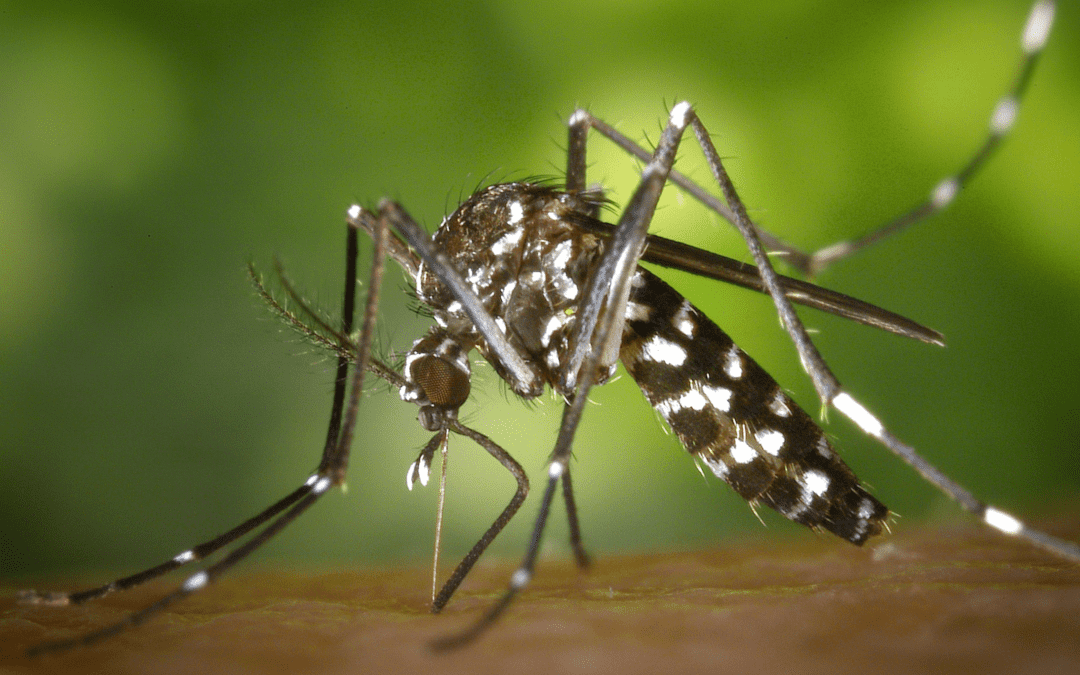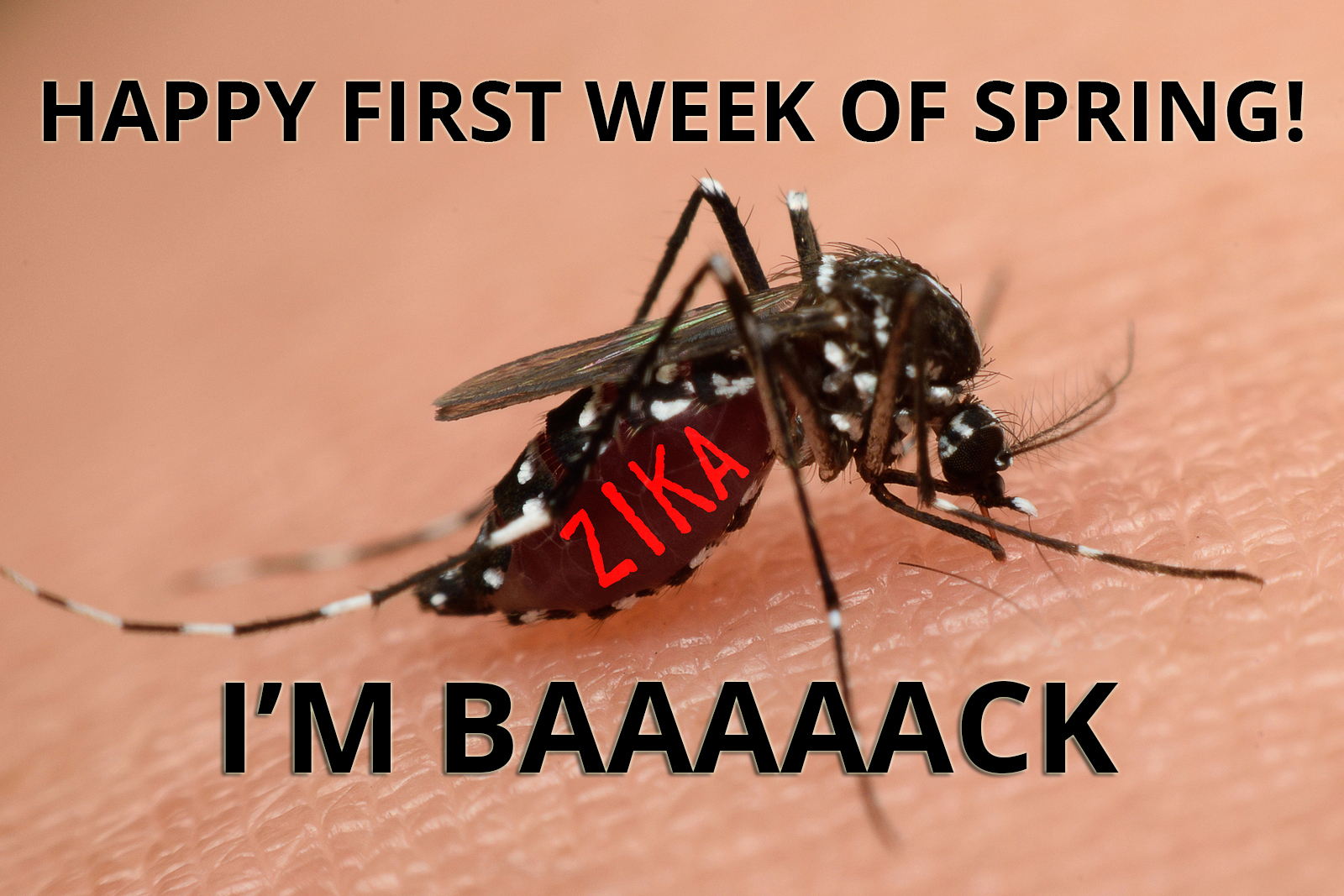READY TO GET STARTED?
REQUEST A FREE ESTIMATE
Fill out the form below or call (888) 466-7849 for a free, no-obligation estimate.

Spring is back, meaning the pesky pests that are mosquitoes are back too! If you haven’t thought about mosquito prevention, then now is the perfect time to begin. Mosquitoes are a major nuisance and they can also pose health risks to humans, dogs, cats, and horses by transmitting diseases. Placing preventative measures throughout your yard to reduce their activity will help avoid the risk of spreading diseases. Keep reading to discover more about mosquitoes.
Mosquitoes are very small, about 1/8” – 3/8” long. They have six legs and long mouthparts called a proboscis. Their coloring varies from grey to black with some having white, green, or blue markings. They are typically difficult to spot as they fly because of their small size. They are most active from dawn to dusk.
It’s a well-known fact that mosquitoes do feed on blood. Only female mosquitoes bite and feed on humans so they can lay fertile eggs. Most mosquito species breed continuously, so a female will typically search for a blood meal every two days to lay another batch of eggs. However, both male and female mosquitoes feed on nectar from flowers for their main source of energy.
Yes. Many people are bitten by mosquitoes with no side effects, except the typical itchy welt. However, mosquitoes can be the cause of many diseases. If they feed off a diseased host, some can spread pathogens that can infect other hosts it later bites.
Mosquitoes are known to spread West Nile Virus, Eastern equine encephalitis, and dengue fever in the US. Around the world they are known to spread yellow fever, malaria, and chikungunya. These illnesses do not come with specific treatments and people have varied reactions to each virus, sometimes with fatal results.
Mosquito prevention begins with eliminating all sources of standing water. Mosquitoes lay their eggs in water to allow larvae to develop. This can be as easy as changing out your birdbath water daily, keeping gutters clear of debris to prevent clogging, and checking AC drip pans for standing water.
A small fan at outdoor gatherings can also help reduce mosquitoes. The most important way to repel mosquitoes is by wearing effective insect repellent sprays or protective clothing while outside.
Taking these steps can help to prevent high mosquito activity; though, it might be best to call your local pest control company to help with future infestations. A trained service professional can provide you with a customized prevention and treatment plan to help eliminate these pests throughout your property.

Spending time outdoors is a great way to escape the hustle and bustle of everyday life. Whether it’s spending time by the pool, having a picnic, or just lounging in the yard, relaxing outside is a great activity for the whole family. But the last thing you want to have to deal with while spending time in your yard are mosquitoes. Mosquitoes can be a danger to your family and even pets as they survive by sucking blood from animals and humans. They are usually found in areas of high humidity looking for stagnant, standing water to breed. Luckily, there are ways you can prep your yard to prevent mosquitoes.
Remove Unnecessary Items
Since mosquitoes breed in standing water, it is essential to eliminate any items that could hold water. Items such as foundations, toy buckets, outdoor pet bowls, flowerpot sauces, tarps, pool covers, and more should not stay in your yard for a long period of time. It’s also important to remove excess grass, leaves, firewood, and yard clippings as mosquitoes tend to stay in grass and debris around your home.
Clean Your Gutters
Clogged gutters can not only create standing water but will also catch debris and leaves. This provides mosquitoes a perfect breeding location. Make sure that your gutters are clean and clear, especially after a thunderstorm. Consider installing gutter guards to help prevent clogs and clutter.
Fill Hollow Areas
Any low-lying areas like ditches can also collect standing water after rain or watering plants. Make sure to check around your yard that you don’t have these; if you do notice them you can simply fill them in with dirt. Additionally, check for any hollow logs and stumps throughout your yard. They not only can hold standing water but will also provide overwintering mosquitoes a place to hibernate during cold weather.
Maintain the Pool
If you have a well-maintained pool, mosquitoes will most likely avoid it. However, if a pool goes unused for a long period of time, these pests will be attracted to the stagnant water. Make sure to keep the pool maintained or covered if you’re planning to not use it for a while.
By utilizing these tips, you can start to enjoy your yard and worry less about mosquito bites! If you are still having an infestation of mosquitoes, it’s best to contact your local pest company to provide you with the best plan of action to eliminate mosquitoes. Request a Free Estimate now to get started.

The sun is shining, the warm breeze is blowing, you’ve got your feet up, unwinding from the week, when…OUCH! That moment of relaxation you’ve been waiting for was suddenly interrupted by a painful mosquito bite. At this point you’re annoyed, thinking about going back inside to avoid more bites, or wondering if you should make an appointment with your doctor to check for Zika or West Nile. What a summer bummer!
Mosquitoes not only pose serious risks for your family, but pets are a target too. Heartworms are parasites transmitted to dogs and cats through mosquito bites, that live in pets’ bloodstream, lungs and heart, and can cause serious, even deadly, side effects.
Don’t let mosquitoes suck the life out of your summer. Protect family and pets and take back your yard with these easy mosquito bite prevention tips:
Mosquitoes breed in areas with stagnant, standing water like fountains and water features, toys, buckets, outdoor pet bowls, bird baths, clogged gutters, vases, flowerpot saucers, old tires or tire swings, rain barrels, trash cans and trash can lids, tarps, kiddie pools, and pool covers. The best way to prevent mosquito bites is to remove these items/areas and to treat your yard with mosquito control products. This is included in a monthly mosquito reduction program and is guaranteed to drastically reduce the number of mosquitoes in and around your yard.
One of the best ways to prevent Zika and other mosquito-borne diseases is to use skin-applied insect repellent when you’re going to be outside. Formulas that contain DEET and picaridin were found to be most effective at preventing mosquito bites (and those with natural plant oils least effective), according to Consumer Reports.
If you really want to further prevent bites, keep arms and legs covered when outdoors with light-colored, loose clothing. Sometimes this can be just as uncomfortable as getting bitten, though, with the scorching summer heat. If you leave skin exposed, be sure to reapply insect repellent often (especially if you’ll be swimming).
Consider using fans in areas you’ll be hanging out this summer – on decks, patios, around pools, etc. Mosquitoes are weak fliers so the winds from fans will make it hard for them to get close enough to bite.

It’s the first official week of Spring (aka Mosquito Season)! Time to start thinking about mosquito prevention.
The risk of contracting mosquito-borne Zika virus in the U.S. is at an all-time high, specifically dangerous for pregnant women or those trying to conceive as the virus can cause serious birth defects. According to the CDC, 222 cases of Zika were reported as of March 15, 2017, acquired through local mosquito-borne transmission in Florida and Texas. And because there’s currently no vaccine for Zika, the only way to prevent it is with mosquito bite prevention. Here’s how you can minimize your risk and limit the spread of Zika.
The best way to prevent mosquito bites when spending time outside this spring and summer is to reduce mosquito populations around your home with a mosquito control program. Usually consisting of monthly treatments, a professional mosquito control program includes:

It’s the first official week of Spring (aka Mosquito Season)! Time to start thinking about mosquito prevention.
The risk of contracting mosquito-borne Zika virus in the U.S. is at an all-time high, specifically dangerous for pregnant women or those trying to conceive as the virus can cause serious birth defects. According to the CDC, 222 cases of Zika were reported as of March 15, 2017, acquired through local mosquito-borne transmission in Florida and Texas. And because there’s currently no vaccine for Zika, the only way to prevent it is with mosquito bite prevention. Here’s how you can minimize your risk and limit the spread of Zika.
The best way to prevent mosquito bites when spending time outside this spring and summer is to reduce mosquito populations around your home with a mosquito control program. Usually consisting of monthly treatments, a professional mosquito control program includes: